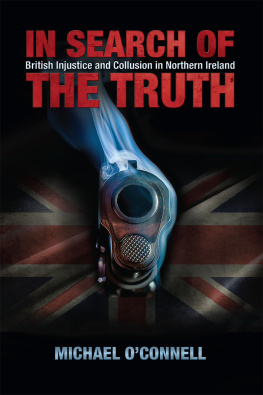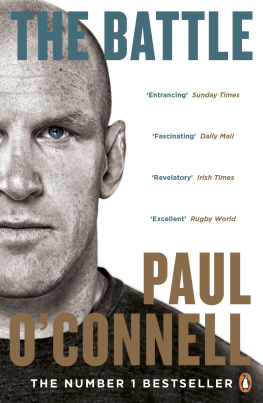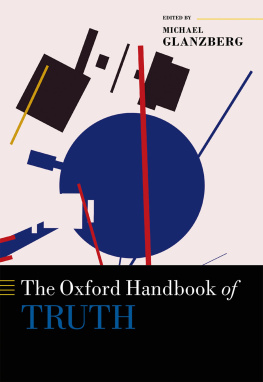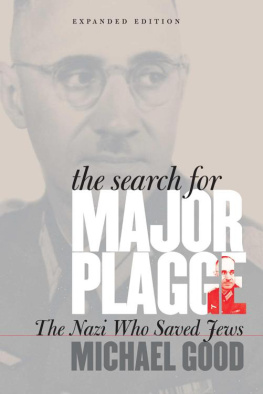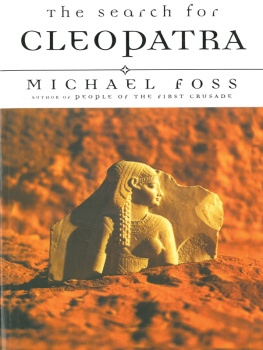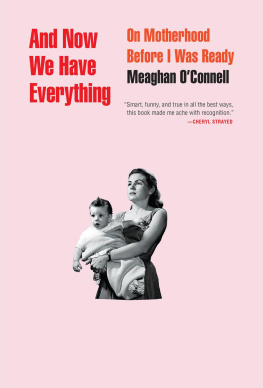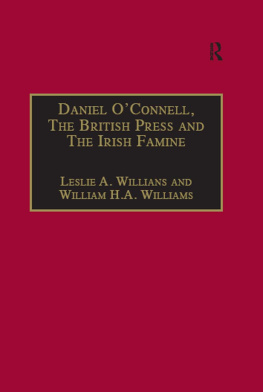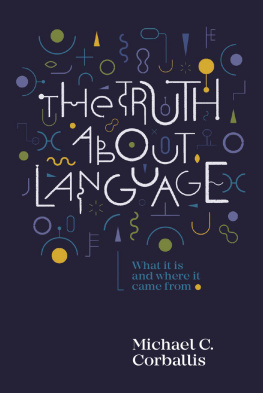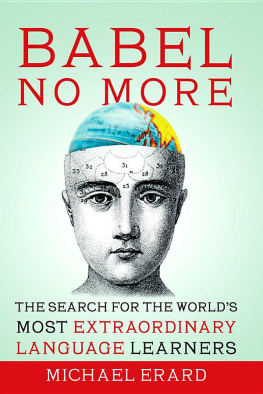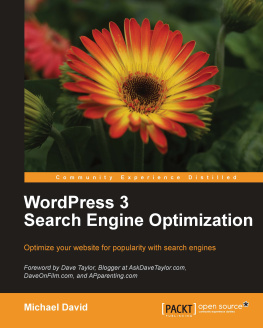MICHAEL OCONNELL, from Nottingham, has divided his time between Ireland and England since childhood. He specialised in criminal law in England, Wales and Ireland from 1966 and was legal adviser to the Catholic Social Services for Prisoners, a charity helping prisoners and their families. The author of several books on the criminal justice system, he jointly edited nine editions of Blackstones Statutes on Evidence (Oxford University Press).
Stay up to date with the author on Facebook at:
michael.oconnell.5076
This book is dedicated with love to my wife, Eileen, to my two sisters, Mary and Patricia, and my brother, Charles. Also to the memory of my parents, James and Mary OConnell.
CONTENTS
I wish to thank the many people who helped me write this book. Special thanks go to my two old friends and colleagues, Professor Terence Walters BL, LLB, LLM and Phil Huxley LLB LLM. Their knowledge of criminal law and procedure and the law of evidence is immense. The views expressed in this book, the conclusions drawn, and any errors are mine alone.
CCRC Criminal Cases Review Commission
CID Criminal Investigation Department
CPS Crown Prosecution Service
DC detective constable
DCI detective chief inspector
DCS detective chief superintendent
DPP Director of Public Prosecutions
Det Sgt detective sergeant
Det Supt detective superintendent
ESDA electrostatic detection apparatus
HET Historical Enquiries Team
INLA Irish National Liberation Army
IRA Irish Republican Army
MOD Ministry of Defence
NCO Non-commissioned Officer
NG nitroglycerine
NICRA Northern Ireland Civil Rights Association
PACE Police and Criminal Evidence Act 1984
PC police constable
PCA Police Complaints Authority
PIRA Provisional Irish Republican Army
PSNI Police Service of Northern Ireland
QC Queens Counsel
RARDE Royal Armament Research Development Establishment
RMP Royal Military Police
RUC Royal Ulster Constabulary
SLR self-loading rifle
SSU Special Support Unit (RUC)
TLC thin-layer chromatography
UDA Ulster Defence Association
UDR Ulster Defence Regiment
UVF Ulster Volunteer Force
BETWEEN 14 AUGUST 1969 and 31 July 2007 the British army ran an operation in Northern Ireland in support of the civil power. Codenamed Operation Banner, it was the longest continuous campaign in the history of that army. In response to a Freedom of Information request the Ministry of Defence (MOD) disclosed that 1,441 members of the UK armed forces died as a result of operations in Northern Ireland or Irish terrorism in other countries. There were many more civilian casualties. The figures are both daunting and haunting. One casualty, however, was the truth. There are some who call for the establishment of a truth commission, claiming that there can be no reconciliation and forgiveness without truth. I believe that will never happen. The British state has concealed the truth about the past in a bodyguard of lies for too long to allow the world to know exactly how it fought its carefully selected enemy. Britain was a colonial power, Northern Ireland its last colony. It has always operated on the basis of purchasing one part of the population and intimidating the other. For a country of its geographical size and population, the United Kingdom of Great Britain and Northern Ireland has had a disproportionate influence on world events. That influence has not always been beneficial to the people of these islands, but for some at the top echelons in society, colonialism has meant wealth, power and prestige, often at the cost of the lives of others.
The document containing these quotations was released by the British government in 2002 under the 30-year rule, which allows public access in the National Archives to documents of state. Some politicians and members of the legal establishment immensely dislike that rule and would like to safeguard secrets of the state for ever. In one of the cases described below, that of the Guildford Four, many of the documents were originally sealed for 30 years, but did it become apparent to someone that they contained material that contained the suppressed truth, so a decision was made that they should be sealed for 75 years? This will ensure that those who have an interest in uncovering that truth will no longer be around to do so.
During this time of sectarian strife in the early 1970s, efforts were made to preserve the rule of law, but the fact is that the legal system in Northern Ireland was not detached and impartial, but had long, since the inception of the Province of Ulster, directly reflected the sectarian politics of a very confused society.
The decision-makers at the top echelons of British society have always acted, so they allege, in the name of bringing democratic principles to those not fortunate to be able to acquire them for themselves. Behind the colonial administrators and civil servants who introduced the native population to the rule of law was the British army, soldiers of which fought and died in foreign fields without knowing exactly why they were there. They manned the concentration camps in the Boer War in South Africa at the beginning of the twentieth century, without asking why. It is said that 20,000 women and children died in these camps after an outbreak of measles. In the First World War, thousands of Irishmen fought alongside their English, Welsh and Scottish comrades for the freedom of small nations, not realising that in their own homeland others were fighting and dying for the same principle.
It has long been my view that it was the Easter Rising in Dublin in April 1916 that spelled the beginning of the end of the British Empire. There was no public support for those who considered it a great and glorious thing to die for Ireland until the military blunders of courts martial and summary executions, followed by the desecration of the dead leaders by dumping their bodies in a pit so revolted the country that the Empire started to fall asunder from then on. There was no going back after that.
During the Second World War the British armed the Communists in their fight against the Japanese in Malaya. When the Japanese surrendered in 1945 the Communists turned on the British, using the very armaments provided for their own armed struggle, killing many young British servicemen. No one will ever discover, or even want to discover, the truth about the killings by the Scots Guards of unarmed men in Batang Kali in December 1948, any more than they want to find out the truth about similar actions in Northern Ireland.
illustrates the links between the legal process in Great Britain and Northern Ireland. It is a reminder that the law of Northern Ireland is closely bound up with that of England and Wales, even though some seek to deny that connection. I describe events in a criminal case that shows the abuse of power, corruption on an industrial scale, and hypocrisy of the worse possible kind. The case involved the brutal murder of the daughter of a High Court judge in Country Antrim in 1952 that remains unsolved to this day.







